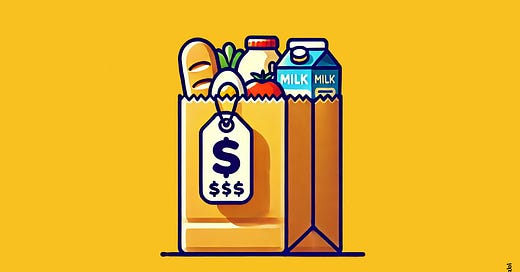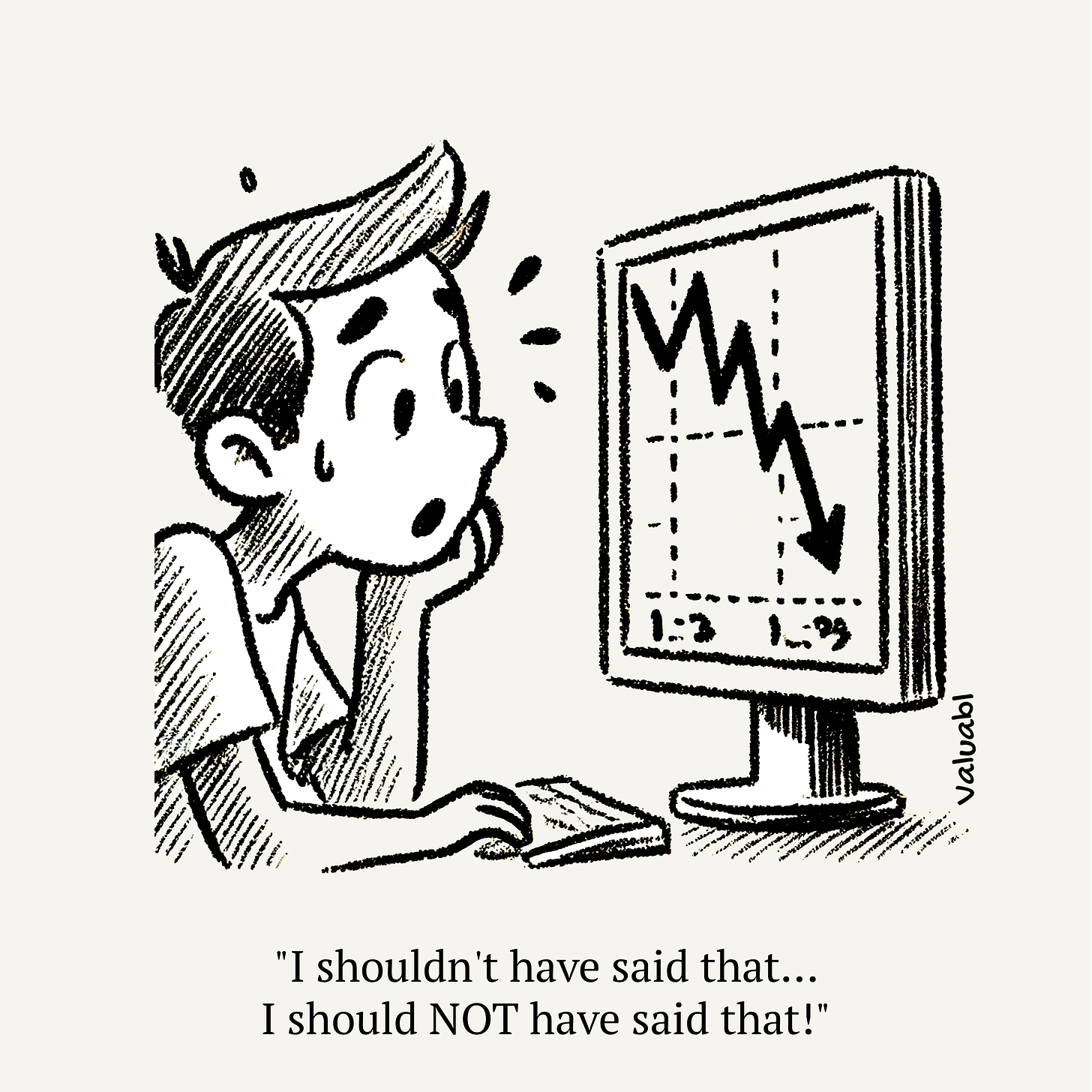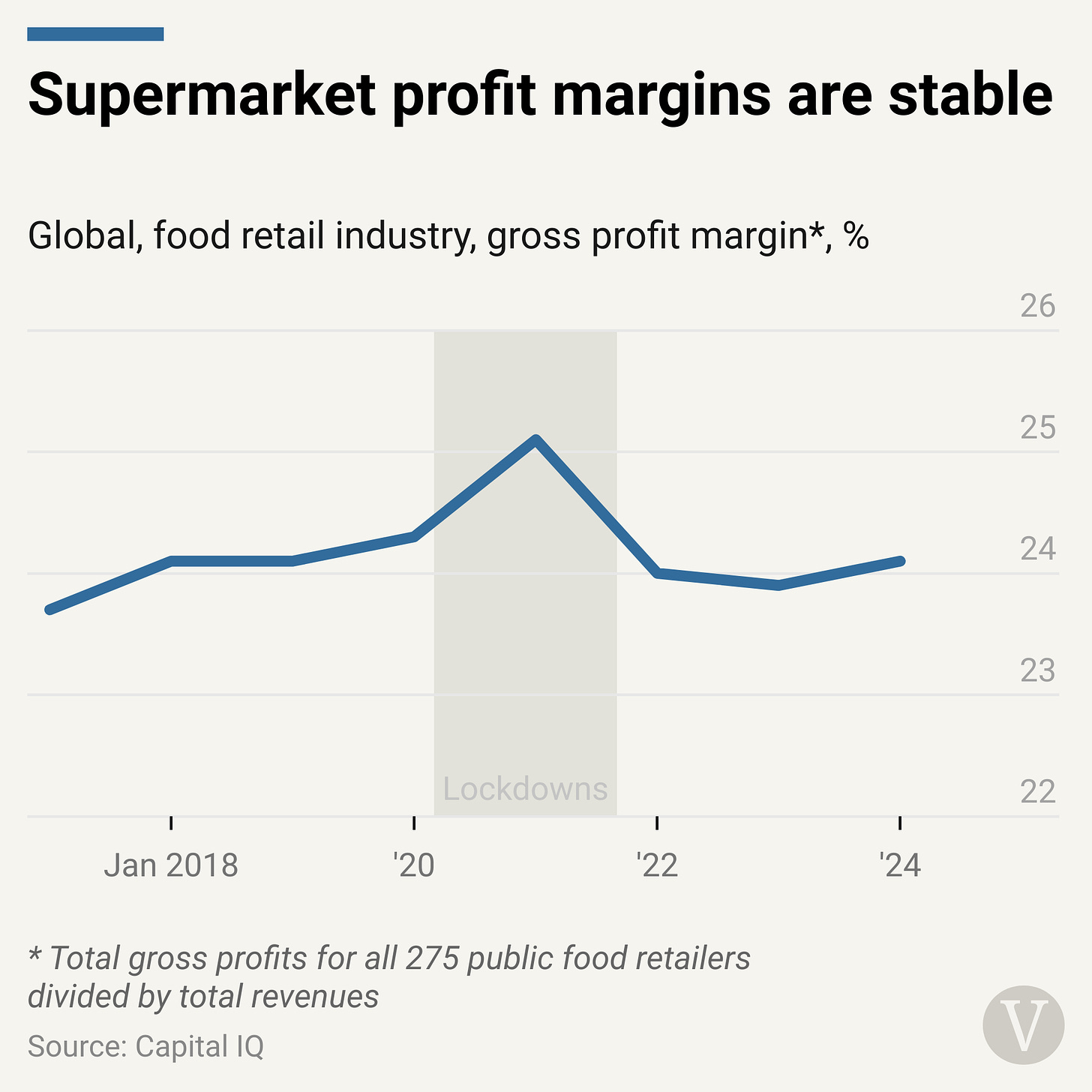Vol. 4, No. 18 — Up, up, prices are up
Higher costs not price gouging are to blame for rising grocery bills; OpenAI isn't worth the $100bn price tag; Stop reading into Buffett's every move; A sports fashion retailer with 50% upside
Contents
The world this fortnight | A summary of economic and financial news
Economics | Up, up, prices are up
Letters to the editor | On inflation and the bear market
Finance | Mind your large language
Opinion | Much to see about nothing
Cost of capital | Analysis of the ever-changing price of money
Investment idea | A sports fashion retailer with 50% upside
Indicators | Economic data, markets and commodities
The world this fortnight
Nvidia, a chipmaker, reported its quarterly earnings. Revenues surged 122% to $30bn, and net profits lept to $16.6bn. But, since this growth was slower than the previous quarter’s 262% rate, its share price fell. Analysts keenly watch the firm’s earnings as an indicator of how the artificial intelligence boom is going.
PDD Holdings, which operates the Pinduoduo and Temu e-commerce sites, warned that slower economic growth in China would “inevitably” lead to lower sales and profits. These comments caused its share price to plummet by 29%, cutting $55bn from its market value. The retailer had previously managed to withstand the impact of China’s depressed economy.
Chinese electric car maker, BYD, reported a 16% jump in revenue and a 25% rise in net profits for the first half of this year. The impressive result comes despite a price war in China, its home market. The company delivered more than 426,000 fully electric cars in the second quarter, a 21% year-on-year increase.
Lego, the Danish company behind the toy bricks of the same name, reported that revenues and operating profits rose in the first half. The company has become more creative with its play sets. These included new “Jaws” sets with sharks, boats, and film characters. The firm has expanded its market share while its rivals face sinking sales.
Alimentation Couche-Tard, a Canadian convenience store operator, has made a friendly offer to buy Seven & i, a Japanese holding company that owns the 7-Eleven chain. It is the largest attempted buyout of a Japanese company ever.
The Canadian government imposed a 100% tariff on Chinese-made electric vehicles and a 25% duty on Chinese steel and aluminium. Lawmakers followed similar actions by their American and European counterparts. They claim the Chinese state gave unfair subsidies to these industries. Unsurprisingly, bigwigs in Beijing warned that these measures would harm trade and cooperation between the two countries.
The Riksbank, Sweden’s central bank, slashed its main interest rate by 0.25 percentage points to 3.5%. That followed a 0.8% gross domestic product drop in the second quarter. The Riksbank announced plans to lower the rate two or three more times this year to support the economy.
Gold prices reached shiny new heights. They’ve risen 20% since the start of the year as investors clamour to buy the precious metal ahead of expected rate cuts by the Federal Reserve, America’s central bank. Investors often view gold as a safe-haven from inflation and declines elsewhere.
Roughly 4.4% of American workers reckon they’ll lose their jobs within four months, the highest level in a decade. In addition, 11.6% think they’ll move to a new job, according to the same report from the Federal Reserve. Many workers are disgruntled. They believe that wages, benefits and promotion opportunities have tanked. ■
HOW TO VALUE STOCKS: This new book will teach you how to value any public company, guiding you step-by-step through the process with real-world examples. Whether you’re new to valuation or an experienced investor, this book will help you make better investment decisions.
Economics | Price gouging
Up, up, prices are up
Politicians have tried to blame supermarkets for higher grocery bills. But higher costs are the reason, not corporate greed.
Big business continues to get bigger. Earlier this week, Coles, an Australian supermarket chain, announced its earnings. The grocers annual sales and profits surged. Revenues jumped 4% to A$43.6bn ($29.6bn), and the firm's net profit after tax hit A$1.1bn. Cue the political outrage. "Up, up, profits are up," wrote Adam Bandt, the leader of the Australian Greens party, in a post on X, a social media platform. Other politicians and pundits have jumped on the outrage bandwagon, too. They reckon the Aussie supermarket chains are price-gouging, charging unfair prices. And, because of that, those pundits think families are paying the price.
It's a similar situation all across the world. Household budgets are stretched, like too little butter scraped across too much toast. Lawmakers are on the hunt for someone to blame. And they've put supermarkets in the cross-hairs. So, are supermarkets price gouging? No. The higher prices you now pay at the till have come from rising costs, not corporate greed.
We know the Aussie supermarkets haven't price gouged because their profits aren't fat. While A$1.1bn seems like a lot of money, it's tiny for a company the size of Coles. Further, in the last year, Coles produced a 26% gross profit margin. When you tally up all the food they sold last year and take away the cost of buying it, there was 26c of profit left per dollar customers spent. That also may seem like a good result, but the firm has to then pay rent, utilities and staff with that 26c.
Woolies, as Australians call Woolworths, hardly fared much better. The nation's largest supermarket chain produced a 26.7% gross profit margin. In comparison, the average margin produced by a public food retailer worldwide was 27.5%. That means the mark up Coles and Woolies stick on their bananas and steaks is about average. If they had pushed prices too high, their profit margins would be bodacious. But they're not. If they exploited the pandemic to hike grocery bills, then margins would've expanded. They didn't.
Yet, some commentators say that it's the global industry as a whole that has profiteered. If that were the case, comparing Coles and Woolies to averages would be meaningless. But we also know that the industry worldwide hasn’t price gouged as profits margins are also low and stable. The food retail industry's total gross profit margin spiked during the pandemic. But, otherwise, it hasn't moved for almost a decade. The sector made a 24% gross margin in 2018, the same margin it made this year. The margin rose a meagre one percentage point to 25% in 2021, but dropped back to 24% the following year. If the industry had started to rise prices to boost profits, margins would have risen. But, again, they didn't.
Moreover, the industry's net profit margin—what's leftover after all expenses—is low. Public supermarket chains earned a paltry 1.7% net profit margin in the last year. That means for every $100 shoppers spent, the supermarket only kept $1.70 after all costs. Where are the juicy profits if grocers have put prices up without a good reason? If grocers had gouged, margins should have been fat and would have gotten fatter. There's only one explanation left for the higher price you've paid at the till: larger costs.
So, why are politicians going after groceries? They have used supermarkets as a scapegoat to appear more relatable. It's a strategy as old as politics itself: create a shared, hard-to-define enemy and go after them. In America, Kamala Harris, the Democratic nominee, said she'll crack down on "excessive prices" if she becomes president. She railed against supermarkets in particular. She says grocery prices are too high. But she hasn't clarified what she means other than government-set prices. In Australia, Mr Bandt wrote on X that the government has "done nothing to stop supermarket price gouging." As with Ms Harris, he was light on detail or solutions.
These statements are strongman bluster, especially as there's no evidence of price gouging. People pay for groceries every week making prices memorable. And since families feel how light their wallets are, they want someone to blame. It's easy for politicians to set up grocers as the scapegoat as it makes them look empathetic and tough. But it's terrible economics. Price controls will create shortages and layoffs, as they almost always have. We won't be able to fix the problem until lawmakers get a grip on what it actually is. ■
SPREAD THE LOVE: Share 𝑉𝑎𝑙𝑢𝑎𝑏𝑙 with your friends and colleagues to look like the smartest person they know. You’ll also go into the draw to win a free six-month subscription. The will be one draw every two weeks, and winners will be notified by e-mail.
Letters to the editor
Inflation nation
I recently read your article about inflation and couldn’t help but feel it oversimplified what is a very complex issue. Yes, oil prices play a role in driving consumer prices, but to suggest they are the leading cause of this latest wave of inflation seems to miss the bigger picture.
Inflation is not about just one thing. It is influenced by many factors—money supply, government spending, supply chain disruptions, and global events like the pandemic and conflicts abroad. While oil prices do impact transportation and production costs, there is much more happening. By focusing so much on oil, the article overlooks other crucial factors that also contribute to inflation.
For example, the money supply does matter. When governments and central banks inject money into the economy, it can increase demand, which in turn leads to higher prices. Ignoring this aspect does not give readers the full story. Inflation is a complex puzzle, and no single piece, like oil, can explain it all.
We need a more balanced discussion to truly understand what is happening with our economy. Simplifying it to “oil caused inflation” does not do justice to the complexity of the issue. I hope future articles will take a broader view and help readers see all the factors at play.
— Andrei Vasilev, Belgrade
Dummy bears
Read your article “Gummy bears“. Feels way too chill about the risks. Unemployment’s up, and that’s always been bad news, but you just brush it off. Also, if the market’s overvalued, why act like a crash isn’t coming? Telling people to hold on seems kinda reckless. No offence, but in my opinion, your whole report is pretty dumb.
— Brandon Miller, Denver
Reply directly to this email or send your commentary, critiques, and rebuttals to valuabl@substack.com. You can also direct message ValuablOfficial on X. Please include your name and city. Letters may be edited for brevity.
Finance | Computer chips made of diamonds?
Mind your large language
OpenAI reckons it’s worth $100bn. Is it?
OpenAI, the company behind ChatGPT, wants to raise more capital. The artificial intelligence (AI) firm’s got bills it's gotta pay. It needs to buy more computer chips, hire coders, and write huge cheques for electricity. It also wants to expand the capacity of its large language models which understand and create text. The firm last raised money in January 2023 at a $29bn valuation—an eye watering sum. Yet, the current ask will gobsmack the pundits who saw even that price as a stretch.
According to a report from the Wall Street Journal, the firm's bosses want to sell shares to private investors at a $100bn valuation. And they'll get it, too. Thrive Capital, a venture capital firm, plans to invest $1bn. At the same time, Microsoft, OpenAI's largest outside investor, will also pony up. So, is OpenAI worth $100bn? The underwhelming answer is maybe. That valuation is generous but not insane.







